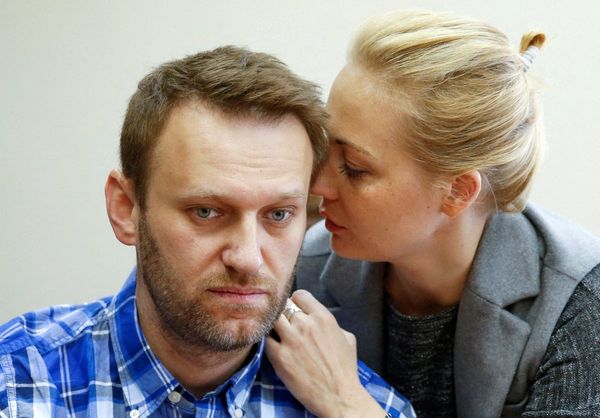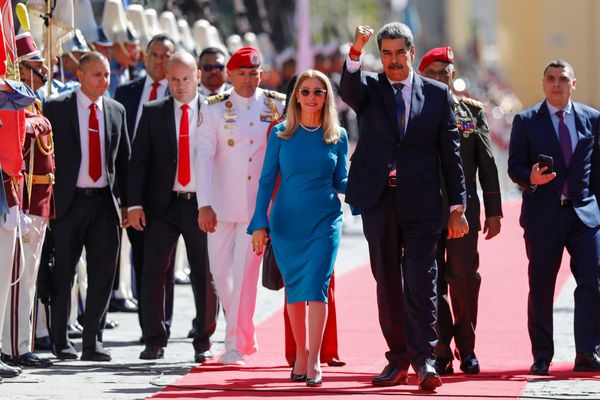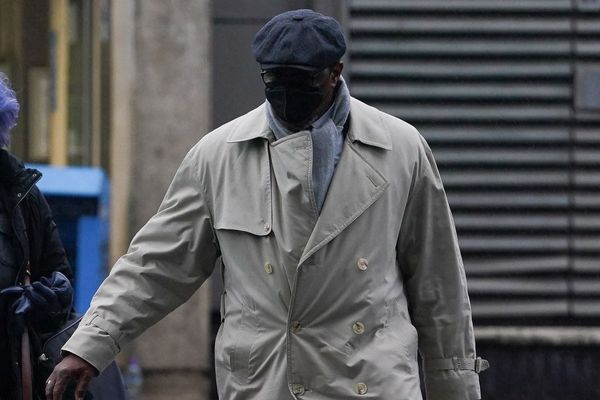
Ukrainian forces have destroyed parts of a Russian armoured column as it tried to cross a river in the Donbas region, video from Ukraine’s military shows, as the Ukrainian defence minister predicts many weeks of grinding fighting ahead.
Ukrainian forces have driven Russia from the second-largest Ukrainian city of Kharkiv in their fastest advance since Kremlin troops pulled away from Kyiv and the northeast more than a month ago to focus their offensive on the Donbas region bordering Russia.
The city, which had been under fierce bombardment, has been quiet for at least two weeks and Reuters journalists have confirmed Ukraine controls territory stretching to the Siverskyi Donets River, about 40 kilometres to the east.
However, Moscow is still bombarding villages north of Kharkiv.
Some 10km north of the city, firefighters doused smouldering wreckage in Dergachi after what local officials said was an overnight Russian missile attack on the House of Culture, used to distribute aid.
“I can’t call it anything but a terrorist act,” the mayor, Vyacheslav Zadorenko, told Reuters. “They wanted to hit the base where we store provisions and create a humanitarian catastrophe.”
Russia, which denies targeting civilians, said its forces had shot down a Ukrainian Su-27 aircraft in the Kharkiv region and disabled the Kremenchuk oil refinery in central Ukraine.
Southeast of Kharkiv, Britain said Ukraine had stopped Russian forces crossing the Siverskyi Donets river west of Severodonetsk. Footage released by Ukrainian Airborne Forces Command appears to show several burnt-out military vehicles near segments of a partially submerged bridge and many other damaged or abandoned vehicles, including tanks, nearby.
The Kremlin calls its February 24 invasion of Ukraine a “special military operation” to demilitarise a neighbour threatening its security. Ukraine says it poses no threat to Russia, which is waging a war of aggression.
“We are entering a new, long phase of the war,” Ukrainian Defence Minister Oleksii Reznikov said in a Facebook post, predicting “extremely tough weeks” ahead during which he said Ukraine would largely be alone against an “enraged aggressor”.
The British defence ministry said Russia was investing significant military effort near Severodonetsk and Izium, and trying to break through towards Sloviansk and Kramatorsk to complete their takeover of Ukraine’s industrial Donbas region.
Russian-backed separatists said they had taken the Zarya chemical plant in Rubizne near Severodonetsk.
In their first conversation since the invasion, US Defense Secretary Lloyd Austin spoke by telephone on Friday with Russian Defence Minister Sergei Shoigu, calling for an immediate ceasefire and stressing the importance of maintaining lines of communication, the Pentagon said.
Ukraine accused Russia of forcibly deporting more than 210,000 children since its invasion, saying they were among 1.2 million Ukrainians transferred against their will. The Kremlin says people went to Russia to escape fighting.
In Kyiv, a court began hearing the first case of what Ukraine says are more than 10,000 possible war crimes. A Russian soldier is accused of murdering a civilian. Moscow has accused Kyiv of staging such crimes.
In the southern port of Mariupol, Russian forces intensified their bombardment of the Azovstal steelworks, the last bastion of Ukrainian defenders in a city almost completely controlled by Russia after a siege of more than two months.
Ukrainian Deputy Prime Minister Iryna Vereshchuk said “very difficult” negotiations were under way with Russia on getting Ukrainian defenders out of the besieged plant.
Meeting in Germany, foreign ministers from the G7 backed giving more aid and weapons to Ukraine.
The European Union’s foreign policy chief Josep Borrell announced a further 500 million euros ($A750 million) worth of military support that should be approved next week by EU members, and expressed confidence the bloc would agree an embargo on Russian oil.
A day after Russia’s northeastern neighbour Finland committed to applying to join NATO, Swedish Foreign Minister Ann Linde said membership for her country would have a stabilising effect and benefit countries around the Baltic sea.
Joining the 30-nation Western military alliance would end the neutrality the two states and further the expansion of NATO that Putin said his invasion of Ukraine aimed to prevent.







